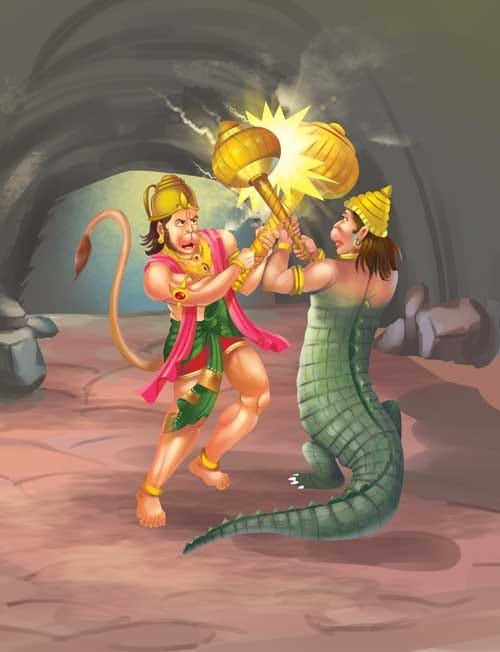Hanuman: The Devoted Celibate
Hanuman, the monkey god in Hindu scriptures, is known for his unwavering devotion to Lord Rama and his feats of strength and courage. A significant figure in the epic Ramayana, Hanuman is revered as a symbol of loyalty and service. His celibacy, or "Brahmacharya," is one of his defining characteristics, contributing to his focused and selfless devotion. Yet, despite his vow of celibacy, Hanuman has a son—Makardhwaja—whose story reveals the mysterious ways destiny can play out.
How Hanuman's Son Came to Be
The tale of Makardhwaja's birth is unique and intriguing. It begins with Hanuman's daring mission to Ravana's kingdom of Lanka, where he sets the city ablaze with his flaming tail as a prelude to Lord Rama's attack. After his successful mission, Hanuman dives into the ocean to extinguish the flames. Unbeknownst to him, a drop of his sweat falls into the mouth of a "Makara," a mythical sea creature with characteristics of a crocodile (magarmachh). This accidental encounter leads to the birth of Makardhwaja, who emerges as a hybrid of monkey and fish.
Makardhwaja is found by the people of Ahiravan, the demon king of the underworld (Patala), who raises him to be a fierce warrior and the gatekeeper of his realm. This peculiar turn of events establishes Makardhwaja's place in the epic narrative, though he remains largely unknown in mainstream tellings of the Ramayana.
The Meeting of Hanuman and Makardhwaja
The paths of father and son cross during a crucial moment in the Ramayana. After Ahiravan captures Rama and Lakshmana, Hanuman embarks on a journey to rescue them from the depths of Patala. Upon reaching the gate of the underworld, Hanuman encounters Makardhwaja, the formidable gatekeeper. Despite their familial bond, Makardhwaja is duty-bound to protect his kingdom, leading to a fierce battle between father and son.
In the heat of combat, Makardhwaja reveals his lineage to Hanuman, explaining how he came to be. Hanuman, initially surprised, realises that his son has the same strength and loyalty that define his own character. Hanuman defeats Makardhwaja but acknowledges his bravery and appoints him as the new ruler of Patala, recognizing his integrity and sense of duty.
A Serendipitous Visit to Sihora Hanuman Mandir, Madhya Pradesh
On Hanuman Jayanti, on 15th April 2014, while discharging my Lok Sabha Election Observer duty in the Vidisha constituency in Madhya Pradesh, I happened to pass by one of the region's most revered Hanuman temples—the Sihora Hanuman Mandir in the Begumganj sub-division of Raisen district. Despite the pressures of the electoral task at hand, the sudden opportunity to visit this sacred site felt more than coincidental; it was as if destiny had woven this into my journey.
As I entered the temple grounds, the air was thick with devotion, resonating with the rhythmic chants of Hanuman's name. Devotees of all ages filled the mandir, their prayers and offerings reflecting the deep-rooted faith that has sustained this temple for generations. The atmosphere was vibrant yet serene, a harmonious blend of spiritual energy and devotional reverence. This unplanned visit became a moment of reflection, a pause in the midst of duty, reinforcing the idea that even in our busiest times, there are unexpected blessings that remind us of the deeper currents of faith and spirituality.
God's Plans and Destiny's Surprises
The story of Hanuman and Makardhwaja is a testament to the unpredictable nature of destiny. Hanuman, the devoted celibate, unexpectedly finds himself with a son, demonstrating that divine plans often unfold in ways we might not anticipate. Yet, each turn of destiny serves a greater purpose, guiding the characters toward their true calling.
With the Ram Mandir consecration at Ayodhya completed, this story reminds us that even the most unexpected events can lead to profound outcomes. It serves as a gentle reminder that God's plans may differ from our own, but they often guide us to where we need to be, affirming that everything happens for the best.








